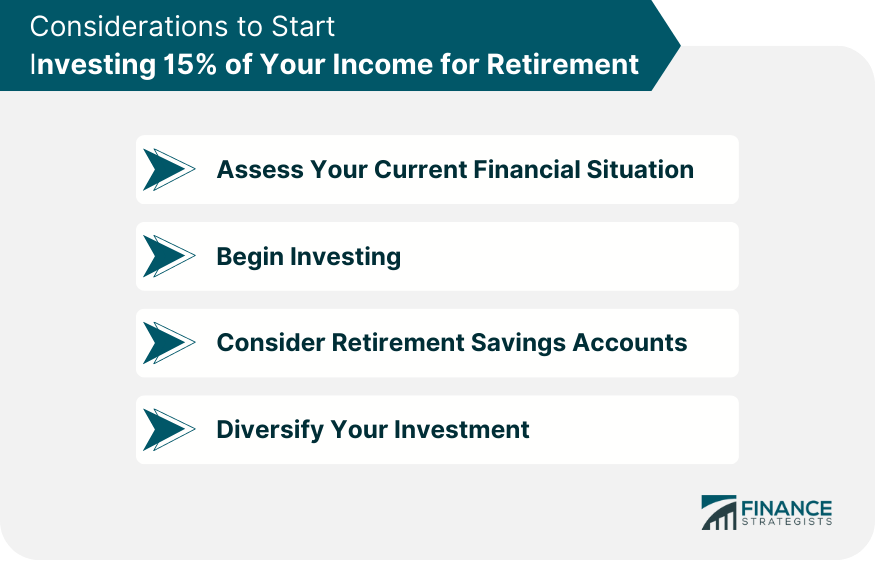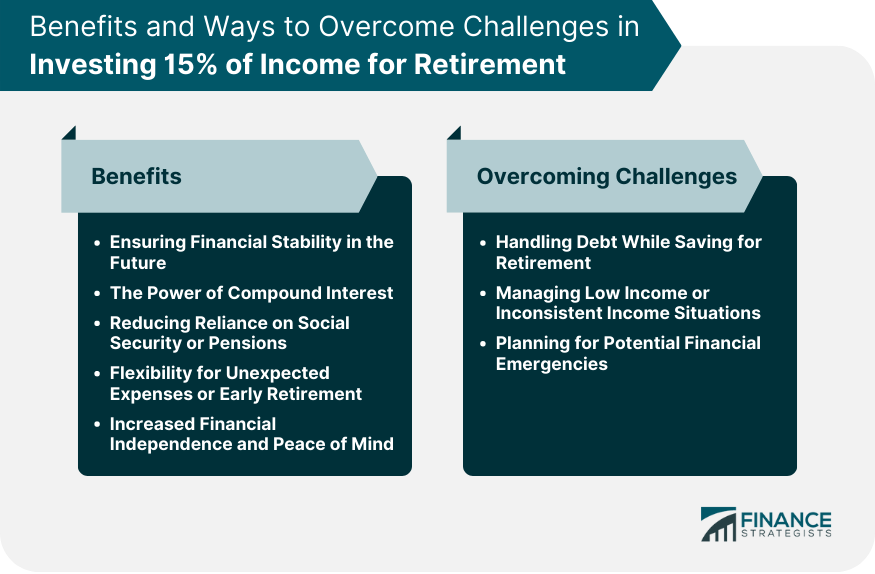Investing 15% of your income for retirement is a crucial financial strategy aimed at securing your financial future. The main reason for this guideline is the power of compound interest, which can turn consistent savings into a substantial nest egg over time. It provides a balance between managing current financial needs and preparing for a future without regular income. Investing 15% of your income not only ensures that your retirement savings grow with your income but also reduces your reliance on uncertain sources like social security or pensions. By steadily building your retirement fund, you can ensure financial stability and independence during your retirement years, even accommodating unexpected expenses. This approach also provides peace of mind knowing you're proactively preparing for your future. Furthermore, by starting early and staying consistent, you can potentially retire earlier or enjoy a more comfortable lifestyle in retirement. The 15% rule is a simple yet powerful financial principle. It suggests that you should aim to set aside at least 15% of your pre-tax income each year for your retirement fund. This strategy is not a hard and fast rule but a guiding principle designed to help individuals build a substantial retirement corpus. By consistently investing a portion of your income into a retirement fund, you are essentially buying your future financial freedom. This is a form of paying yourself first. The 15% rule is an effective strategy because it represents a balance between what is practical for most income earners and what can yield a substantial retirement corpus over time. Compound interest is a key component of the 15% rule. In essence, compound interest is the interest you earn on your initial investment plus the interest that has accumulated over time. This means the earlier you start saving and the more you save, the more compound interest will work in your favor, accelerating the growth of your retirement savings. Before you start investing, it's important to understand your current financial situation. This includes your income, expenses, existing debts, and savings. Starting from a smaller percentage and gradually increasing your contributions can make the transition less daunting. The key is to start saving and investing as early and consistently as possible. There are various types of retirement savings accounts to consider, including 401(k) plans, traditional Individual Retirement Accounts (IRAs), and Roth IRAs. Each has unique benefits and rules that can influence your decision. Diversifying your investments can help to manage risk. This involves spreading your investments across different types of assets and markets. By investing 15% of your income for retirement, you are creating a safety net for your future self. These funds can cover living expenses, healthcare costs, and other needs during your retirement years when you may not have a steady income. As previously mentioned, compound interest can significantly boost your retirement savings. The longer your money is invested, the more time it has to grow. This can potentially result in exponential growth over the course of several decades. While social security or pension benefits can contribute to your retirement income, it's risky to rely solely on them. By investing 15% of your income, you're taking control of your financial future and reducing your dependence on these uncertain sources. Life is unpredictable. By setting aside a significant percentage of your income, you are preparing for unforeseen costs or even the option of early retirement. Investing for retirement contributes to your long-term financial independence. This gives you the freedom to make choices that cater to your lifestyle and preferences. Moreover, knowing that you have a plan can provide peace of mind. Striking a balance between managing debt and saving for retirement can be tricky. One strategy is to focus on paying off high-interest debts while still making smaller contributions to your retirement fund. For those with low or inconsistent income, saving 15% may seem challenging. However, even saving a smaller percentage can make a difference in the long run, particularly if you start early and increase contributions when possible. Having an emergency fund in addition to your retirement savings can provide a buffer for unexpected expenses. This can prevent you from dipping into your retirement fund in case of emergencies. Failure to invest adequately for retirement can lead to financial hardships during your retirement years. This could mean a lower quality of life and fewer options for care and leisure activities. Without sufficient retirement savings, you may end up relying on government assistance or support from family members, which may not be ideal or sustainable. Your lifestyle choices and overall quality of life in retirement can be severely affected if you do not have enough saved. This could mean cutting back on travel, hobbies, or other activities that you enjoy. Investing 15% of your income for retirement is a vital strategy for long-term financial stability. It hinges on the power of compound interest, enabling your savings to grow substantially over time. This guideline is not merely about survival in retirement but about thriving and maintaining your lifestyle. By diversifying your investments and utilizing retirement savings accounts, you can effectively manage risk and maximize potential returns. While you may face challenges such as debt and low income, even small, consistent contributions can make a significant difference. Furthermore, these savings can serve as a safety net for unforeseen expenses, thereby giving you peace of mind. Not investing adequately can lead to financial hardship, dependence on others, and limitations on lifestyle choices in retirement. Hence, making it a priority to invest 15% of your income for retirement is an essential step toward financial independence.Why Should You Invest 15% Of Income for Retirement?
Understanding the 15% Rule for Retirement Savings
15% Rule Defined
How Does the 15% Rule Work?
Role of Compound Interest
How to Start Investing 15% Of Your Income for Retirement
Assess Your Current Financial Situation
Begin Investing
Consider Retirement Savings Accounts
Diversify Your Investment

Benefits of Investing 15% Of Income for Retirement
Financial Stability in the Future
Power of Compound Interest
Reducing Reliance on Social Security or Pensions
Flexibility for Unexpected Expenses or Early Retirement
Increased Financial Independence and Peace of Mind
Overcoming Challenges in Investing 15% Of Income
Handling Debt While Saving for Retirement
Managing Low or Inconsistent Income
Planning for Potential Financial Emergencies

Impact of Not Investing 15% Of Your Income for Retirement
Potential Financial Hardships in Retirement
Dependency on Government Assistance or Family Members
Limitations on Lifestyle Choices and Quality of Life
The Bottom Line
Why Should You Invest 15% Of Income for Retirement? FAQs
Investing 15% of your income for retirement is considered a sound financial strategy because it automatically adjusts with your earning level. As your income increases, the amount you save for retirement also grows, ensuring that your retirement savings keep pace with your lifestyle.
While pensions and social security benefits can provide a base for your retirement income, they may not be enough to maintain your lifestyle in retirement. By investing 15% of your income for retirement, you reduce your reliance on these sources and ensure you have a more robust financial safety net for the future.
While managing debt is important, it's equally vital to save for retirement. The reason is the power of compound interest that allows your savings to grow over time. Investing 15% of your income for retirement, even when you have debts, helps ensure you are financially secure in your later years.
Even if 15% seems unattainable due to a lower income, it's still essential to save as much as you can. Even smaller contributions, if started early and done consistently, can grow significantly over time due to compound interest. The goal is to gradually increase your savings rate as your income improves over time.
Investing 15% of your income for retirement creates a financial buffer for the future, including unpredictable expenses. It also gives you the flexibility to handle unexpected costs or changes in your life, like early retirement, without significantly affecting your retirement lifestyle.
True Tamplin is a published author, public speaker, CEO of UpDigital, and founder of Finance Strategists.
True is a Certified Educator in Personal Finance (CEPF®), author of The Handy Financial Ratios Guide, a member of the Society for Advancing Business Editing and Writing, contributes to his financial education site, Finance Strategists, and has spoken to various financial communities such as the CFA Institute, as well as university students like his Alma mater, Biola University, where he received a bachelor of science in business and data analytics.
To learn more about True, visit his personal website or view his author profiles on Amazon, Nasdaq and Forbes.















